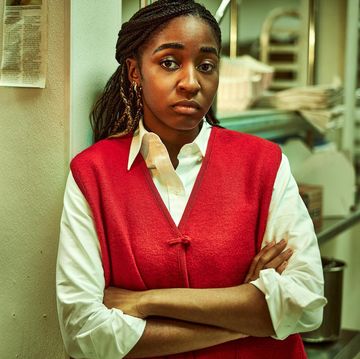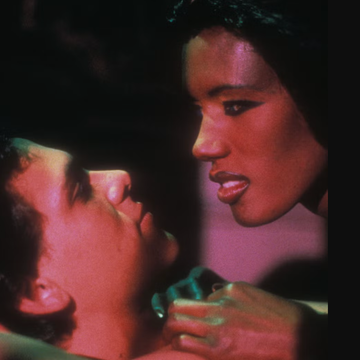Upward mobility is not an option in My Brilliant Friend. It's not even a dream—the characters who inhabit this post-war Neapolitan neighborhood understand their survival is not guaranteed. Last night's episode established violence as a running theme in the series, and tonight's underscores the lack of opportunity. The most obvious should be education, what so many Americans are taught is "the great equalizer"—what Maestra Oliviero sees as a chance for her preternaturally bright students, Elena (Lenù) and Lila, to contribute to society—but this is not America, of course, and education is not a given nor a right.
Lenù and Lila's struggle for education is an essential part of their trajectory, even if that doesn't seem obvious, executive producer Jennifer Schuur tells BAZAAR.com. "You're talking about something—watching children sitting at their desks in a classroom—that isn't inherently dramatic, but it's such an important part of the story of these two girls," she says. "To not show those moments, or to shy away from them out of fear—that it may not be as compelling as something else—would be a tragedy as far as the full story is concerned."
Lenù and Lila's competition for knowledge is perhaps the most significant thread that binds them together through the Neapolitan Novels, starting with the thrown dolls and "what you do, I do" scene depicted in last night's episode. But it really takes shape in Episode 2, which sees Lila determined to set herself, Lenù, and their families on a path to financial stability. She already knows her intelligence is the only thing that will get her out of the neighborhood, and using the money procured from Don Achille for the loss of their dolls, she purchases a copy of Little Women. "The woman who wrote it made so much money that she gave some to her family, who were poor." Lila's certain she and Lenù are smart enough to write a book together that makes enough money to support their families. "We'll read it, we'll see how you write a book, and we'll write one, too. That's how we'll get rich, Lenù."
Seems simple enough. Yet the opportunity for further education prompts ugly, violent controversies within their individual families. Tutoring for middle school costs money, and a daughter attending class is one less pair of hands available to work for a living, or help around the house. Lenù's opportunity to go to continue to middle school sets her parents—prideful, stern Vittorio and venomous, impatient Immacolata—against each other in one of many screaming matches over their daughter's future, behavior, and comportment. Vittorio ultimately wins this battle but warns his daughter there are conditions: “You have to be the best," he tells her. "Good isn’t enough. The best of all.”
Lila is not as lucky. After several attempts at securing a position in middle school—petitions from Maestra Oliviera and her brother, her own stubbornness—her father throws her out the window in a final, brutal assertion of his authority. “You were born to spite me,” he spits at his daughter, lying on top of a broken arm in the dirt. “You’ll do what I say because I’m your father.”
Lila gives up on the promise of school, but quickly sees she's smart enough to forge a path elsewhere. The violence in the neighborhood is escalating, and the death of the all-powerful Don Achille presents new and unexpected paths for success—ones that diverge drastically with Lenù's scholarly pursuits.
My Brilliant Friend airs Sunday and Monday nights at 9 p.m. EST on HBO.















